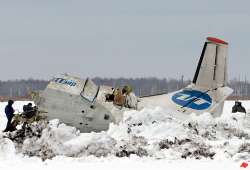Plane Crash In Siberia Kills 31 Of 43 On Board
Moscow, Apr 2: A passenger plane crashed in Siberia shortly after taking off Monday morning, killing 31 of the 43 people on board, Russian emergency officials said. The 12 survivors were hospitalized in serious condition.The

Moscow, Apr 2: A passenger plane crashed in Siberia shortly after taking off Monday morning, killing 31 of the 43 people on board, Russian emergency officials said. The 12 survivors were hospitalized in serious condition.
The ATR-72, a French-Italian-made twin-engine turboprop, operated by UTair was flying from Tyumen to the oil town of Surgut with 39 passengers and four crew.
The aircraft went down on a snowy field outside Tyumen, a major regional center in Siberia about 1,700 kilometers (1,000 miles) east of Moscow. The cause of the crash was not immediately clear.
UTair published a list of the passengers and crew, and none of them appeared to be foreigners.
The Emergency Situations Ministry first said 12 survivors were flown by helicopter to a Tyumen hospital, but that one of them had died. The ministry's regional branch in Tyumen later said that a 12th survivor was in a village hospital and revised the death toll downward to 31.
Russia has seen a string of deadly crashes in recent years. Some have been blamed on the use of aging Soviet-era aircraft, but industry experts point to a number of other problems, including poor crew training, crumbling airports, lax government controls and widespread neglect of safety in the pursuit of profits.
Pilot error was blamed for a crash in Yaroslavl, a city 250 kilometers (150 miles) northeast of Moscow, in September that killed 44 people, including a professional hockey team.
Pilot error and fog also were ruled the main causes of a crash in April 2010 that killed Poland's president and 95 other people as their plane was trying to land near Smolensk, in western Russia.
The ATR-72, a French-Italian-made twin-engine turboprop, operated by UTair was flying from Tyumen to the oil town of Surgut with 39 passengers and four crew.
The aircraft went down on a snowy field outside Tyumen, a major regional center in Siberia about 1,700 kilometers (1,000 miles) east of Moscow. The cause of the crash was not immediately clear.
UTair published a list of the passengers and crew, and none of them appeared to be foreigners.
The Emergency Situations Ministry first said 12 survivors were flown by helicopter to a Tyumen hospital, but that one of them had died. The ministry's regional branch in Tyumen later said that a 12th survivor was in a village hospital and revised the death toll downward to 31.
Russia has seen a string of deadly crashes in recent years. Some have been blamed on the use of aging Soviet-era aircraft, but industry experts point to a number of other problems, including poor crew training, crumbling airports, lax government controls and widespread neglect of safety in the pursuit of profits.
Pilot error was blamed for a crash in Yaroslavl, a city 250 kilometers (150 miles) northeast of Moscow, in September that killed 44 people, including a professional hockey team.
Pilot error and fog also were ruled the main causes of a crash in April 2010 that killed Poland's president and 95 other people as their plane was trying to land near Smolensk, in western Russia.